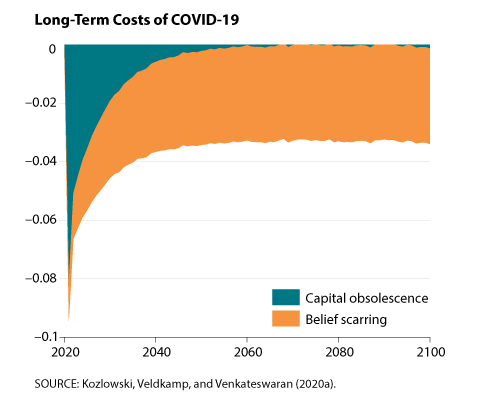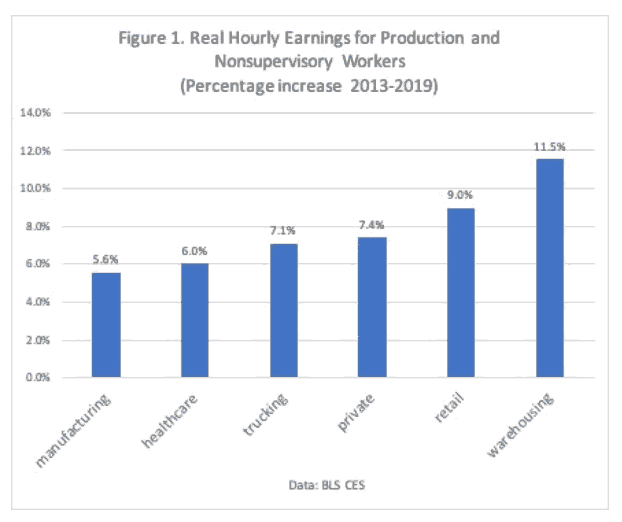The other day, I received my “The Dispatch - Capitolism” newsletter “A Reality Check on Walmart, Amazon and E-Commerce. Going after big retailers won’t end ‘slave labor’ or help small businesses in the ways that populists claim.” This was shortly after I received the “Economic Synopses” article “COVID-19: Scarring Body and Mind” from the St. Louis Fed.1 I was immediately struck with how two very different articles were tied together by the concept of sunk costs.
Most people know what sunk costs are, except for when they don’t. This concept is taught in most accounting 101 classes. It is a simple concept, but people (including me) frequently forget it or ignore it. What one spent on something is economically irrelevant.2 It’s the same as “stop throwing good money after bad.” For example, if I bought a stock for $100, does that matter in my decision to sell it or keep it a day later? That $100 is a sunk (past) cost. All decisions regarding keeping or selling the stock should be made on my need for cash and/or my belief of how much the stock will be worth in the future. The $100 I spent should be irrelevant to the decision.
The St. Louis Fed article includes the following graph showing the long-term costs of COVID-19: 3

There it was, “Capital obsolescence,” as economists described sunk costs. All of the commercial real estate, shopping malls and no-longer-needed-retail space post COVID-19 have a name: “capital obsolescence.” These are the sunk costs of this pandemic. In moving forward, these costs should be ignored, but likely won’t be. Think of all we hear about “saving main street.” As shown on the above graph, the absorption of sunk costs (the capital obsolescence) has an impact on the economy. However, the long-tail and greater economic impact is the psychological knowledge that pandemics exist. In effect, economically, we will move on from the sunk costs but will suffer longer for having gained the knowledge of how we lost them.
In the Capitolism Newsletter, I learned that Josh Hawley berated Walmart in a Twitter Tweet from December 30, 2020:
“… for the pathetic wages you pay your workers as you drive mom and pop stores out of business.”
— Josh Hawley@HawleyMO
Mr. Hawley ignores the concept of sunk costs and perhaps knows most of us often forget the concept. For example, I can’t sell my house – because I have too much sunk into it. The “mom and pop stores” are the sunk costs of populists. Mom and pop stores equal capital obsolescence as spotlighted and amplified by the COVID crisis. As the rule of sunk costs dictates, we ignore them and move on. 4
The St. Louis Fed article then points out why Mr. Hawley is wrong from a capitalistic or economic perspective. It highlights the Accounting 101 rule of sunk costs. The economy moves on. Walmart and Amazon pay better than most mom and pop stores can pay. Walmart saves Americans money, warehousing laborers now make more per hour than manufacturing laborers, and warehouse and retail hourly wages have risen faster than others since 2013: 5

I’m sure I don’t speak for everyone, but I am interested to see what additional economic changes that we otherwise would have been experiencing over the coming years, occur in the next year or two. As you manage through this period, keep in mind Accounting 101.
NOTE: The opinions and thoughts expressed herein are the opinions of Ronald A.Bero, Jr. They are not necessarily the opinions of The BERO Group.
1 A Reality Check on Walmart, Amazon and E-Commerce. Going after big retailers won’t end ‘slave labor’ or help small businesses in the ways that populists claim. Scott Lincicome. https://capitolism.thedispatch.com/p/hawley-walmart-amazon-trade-populism COVID-19: Scarring Body and Mind, Julian Kozlowski. https://research.stlouisfed.org/publications/economic-synopses/2020/12/22/covid-19-scarring-body-and-mind. In addition to my own skills, knowledge, education, experience and training, these two articles serve as the source for this post.
2 This is an overly broad statement because it matters from a tax and gain / loss basis. Additionally, the facts of every economic decision and/or damage calculation are unique.
3 Kozlowski, Julian. "COVID-19: Scarring Body and Mind" available at https://research.stlouisfed.org/publications/economic-synopses/2020/12/22/covid-19-scarring-body-and-mind
4 Of course, as a big fan of Hallmark Christmas movies, there are other reasons not to ignore our small-town main street “mom & pop” stores.
5 U.S. Bureau of Labor Statistics https://www.bls.gov
 For more information about Ronald A. Bero, Jr.
For more information about Ronald A. Bero, Jr.
and The BERO Group visit us here.